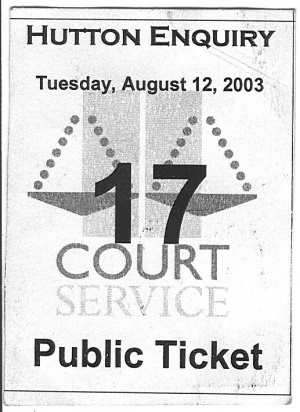Difference between revisions of "David Kelly/Assassination/Hutton Inquiry"
(Allegation "unfounded") |
m (Text replacement - "|WP=https://" to "|wikipedia=https://") |
||
| Line 1: | Line 1: | ||
{{event | {{event | ||
| − | | | + | |wikipedia=https://en.wikipedia.org/wiki/Hutton_Inquiry |
|start= 1 August 2003 | |start= 1 August 2003 | ||
|end= 28 January 2004 | |end= 28 January 2004 | ||
Revision as of 14:13, 26 July 2016
 | |
| Date | 1 August 2003 - 28 January 2004 |
|---|---|
In a House of Commons debate on 4 February 2004, Prime Minister Tony Blair claimed that the Hutton Inquiry report had cleared the government of sexing up its Iraq dossier. He also played down concerns about the dossier voiced by Dr Brian Jones, a former senior Defence Intelligence Staff official.[1]
The debate was interrupted by anti-war protesters shouting "no more whitewashes" and the Commons was suspended for about 10 minutes while the public gallery was cleared. Seven protesters from the Oxford Citizens for Truth group were held by police after the incident and released, one of whom Richard Hering said:
- "There is a completely fake debate, nothing is actually discussed."
But the Prime Minister insisted:
- "I am not ashamed of taking the decision to go to war. I think we did the right thing... I think this country and its armed forces should be proud of what we achieved."
Blair called Andrew Gilligan's report which sparked the Hutton Inquiry "100% wrong" and said the retired law lord's "forensic" report was the best defence against accusations of a whitewash.[2]
Allegation "unfounded"
Chapter 12 of Lord Hutton's report concludes:
- "The term "sexed-up" is a slang expression, the meaning of which lacks clarity in the context of the discussion of the dossier. It is capable of two different meanings. It could mean that the dossier was embellished with items of intelligence known or believed to be false or unreliable to make the case against Saddam Hussein stronger, or it could mean that whilst the intelligence contained in the dossier was believed to be reliable, the dossier was drafted in such a way as to make the case against Saddam Hussein as strong as the intelligence contained in it permitted. If the term is used in this latter sense, then because of the drafting suggestions made by 10 Downing Street for the purpose of making a strong case against Saddam Hussein, it could be said that the Government "sexed-up" the dossier. However in the context of the broadcasts in which the "sexing-up" allegation was reported and having regard to the other allegations reported in those broadcasts, I consider that the allegation was unfounded as it would have been understood by those who heard the broadcasts to mean that the dossier had been embellished with intelligence known or believed to be false or unreliable, which was not the case."[3]
Unanswered Questions
Important questions were never raised - for example, why was the lack of David Kelly's fingerprints on the knife? This question only even emerged because of later FOIA requests made by activists.[4]
Links
- Hutton Inquiry web site
- Hutton Inquiry - At the Open Directory Project
References
- ↑ "Brian Jones obituary" Defence intelligence analyst who challenged the Iraq WMD dossier
- ↑ "Hutton Report 'was no whitewash'"
- ↑ "Hutton Report, Chapter 12, paragraph 467 (1) (viii)"
- ↑ https://www.youtube.com/watch?v=V8EBE0zr4UA